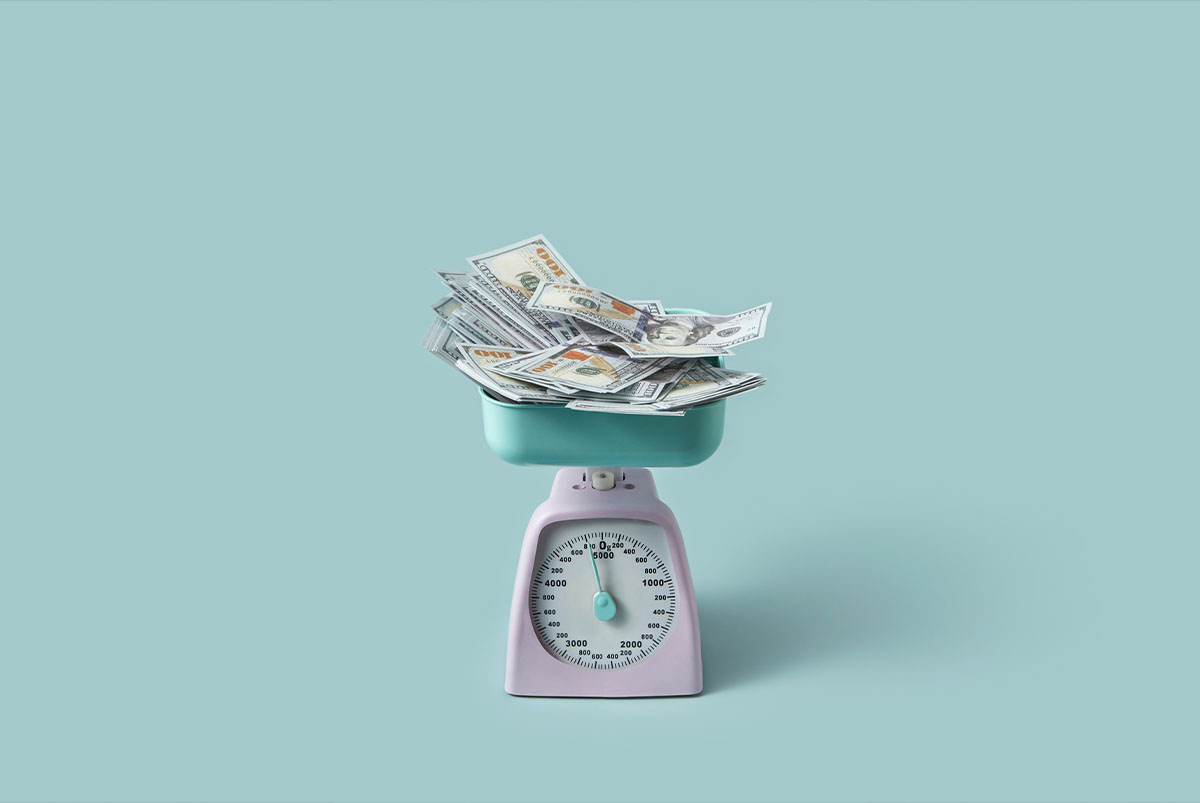Explore your mortgage options
There’s a lot that goes into choosing the right loan type. Personal loans and mortgages are two of the most popular options, but they function in very different ways.
Depending on your goal (or goals), one loan is probably a better fit than the other. Let’s take a closer look at their differences to help you decide which one better suits your needs.
An important caveat: For the sake of comparing these two loan options, we’re assuming you don’t already have a mortgage, so refinancing is not an option. You can learn more about your refinancing options here.
See What You Prequalify For
Get prequalified offers for personal loans from Rocket LoansSM within seconds. Like what you see? Same-day funding is available.
Checking your options won’t affect your credit score.
Mortgages vs. Personal Loans: What Are the Differences?
Mortgages finance real estate purchases, while personal loans are more versatile and can be used for other purchases and investments. Think of it this way: You can take out a mortgage to buy a home and use a personal loan to finance your new furniture.
But the differences don’t end there. Mortgages and personal loans have different repayment plans, interest rates, upfront costs and risk levels.
Loan value
Personal loans typically range from about $2,000 to $45,000, depending on the lender. Mortgages are worth significantly more as they are used to finance the purchase of homes.
According to the National Association of REALTORS® (NAR), the median home price in September of 2023 was $394,300.[1] Even if you assume a 20% down payment, the loan still comes to $315,440.
Use of funds
Personal loans are an extremely flexible type of loan. Once a lender approves you for a personal loan, the funds are distributed into your account as a lump sum. You then have the freedom to spend those funds on whatever you need the loan for.
Mortgages are much more limited in what the funds can be used for and how they are disbursed. There is a multi-step closing process that typically involves escrow accounts. This process is structured to protect all parties, given the amount of money usually involved in these transactions.
Repayment timelines
Mortgage loans have different repayment timelines that are typically lengthy. Some of the most common fixed-rate home loans span 15 – 30 years.
Personal loans are usually paid back in shorter time frames because the loan amounts are smaller than mortgage loans. Personal loans are typically paid back in 7 years max.
Down payments and upfront costs
When it comes to upfront expenses, you’ll pay more for a mortgage than a personal loan. A home buyer’s most significant upfront expense is typically the down payment they make on a mortgage.
A down payment, which ranges from 3% to 20% (or higher), is the money you pay toward a home’s purchase price. This money jump-starts your home equity (think: the amount of home you own).
This is a significant amount of money. Even if you only put 3% down, assuming the median home price of $394,300, that comes to $11,829.
Personal loans usually don’t require a down payment. There will still be some costs, like loan origination fees, but even with them you’ll still pay much less upfront.
Collateral
A secured loan must be backed by collateral (think: your car, home, or another valuable asset you own). If you miss payments (aka default), the lender can keep your collateral to recoup their losses.
Mortgages are secured loans. If you default on your mortgage payment, your house could be foreclosed upon. Conversely, most personal loans are unsecured and (you guessed it!) don’t require collateral. That’s a big difference.
Because most personal loans aren’t secured by anything valuable, lenders assume more risk. As a result, a lender might require a higher credit score or lower debt-to-income (DTI) ratio for approval. And the loan will almost always have a higher interest rate than your average mortgage.
Interest rates
Personal loan lenders don’t have the same protections as mortgage lenders because personal loans are typically unsecured. There is no option to repossess property, so personal loans usually have higher interest rates than mortgages – but this isn’t a cut-and-dried rule.
Is It Better To Take a Personal Loan or a Mortgage?
The short answer to the question comes down to what you need the money for. Refinancing technicalities aside, mortgage loans can only be applied toward real estate purchases, while personal loans can be approved for a broad range of assets and investments.
When to consider a personal loan
Unlike mortgages, there are virtually no restrictions on how you can use personal loans. Some example uses include:
- Home renovation projects: Renovation projects are often used to boost a home’s value and are usually covered by personal loans. If the right upgrades are made, savvy borrowers can cover the cost of the personal loan with the added value of the renovations.
- Debt consolidation: If you’re struggling to pay off high-interest debt like credit cards, you can use a personal loan to consolidate your debt. By combining all your loans and credit accounts into one loan, you’ll only make a single monthly payment on your debt. But this only makes financial sense if your new loan has a lower interest rate than the loans you are consolidating.
- Large purchases and expenses: Personal loans are often used to finance a significant asset. If you’re a business owner who needs to buy a piece of equipment but doesn’t have the cash on hand, a personal loan can be the bridge to cover the money gap and fund the purchase.
Need Funds for Home Improvements?
Apply for a home improvement loan from Rocket LoansSM and start planning your next renovation project.
Checking your options won’t affect your credit score.
When to consider a mortgage
Personal loans offer variety. Mortgages have a specific use. You cannot use the money from a mortgage to purchase or refinance anything other than real estate.
Whether you’re an aspiring first-time home buyer or want to buy an investment property, mortgage financing is the way to go if you can’t afford to purchase a house with cash.
Keep in mind, we’re speaking about mortgages generally for the sake of comparison, but there are many different mortgage types. Speak to a real estate professional to determine which home loan option is best for your real estate goals.
Pros and Cons of a Mortgage
Here’s a list of pros and cons for how mortgages compare to personal loans.
PROS of a mortgage👍
Mortgages come with higher loan values than personal loans, allowing you to finance a property purchase. You’re unlikely to be able to purchase a home with just a personal loan.
Because mortgage loans are backed by the home you’re purchasing, you’ll usually get a much lower interest rate than you would with personal loans.
Mortgages generally come with longer repayment terms than personal loans, which can lower your monthly cost significantly.
As you pay off the mortgage, you’ll gain equity in the home, which becomes an asset in your financial portfolio. When you pay off a personal loan, there’s no added benefit other than reducing your DTI ratio.
You can deduct mortgage interest and property taxes from your federal income tax.
CONS of a mortgage👎
To qualify for a mortgage, your lender will review your credit history, DTI ratio, down payment and other documents. Generally, it’s significantly easier to qualify for a personal loan.
Mortgages are expensive. Between loan processing fees, closing costs and the down payment, upfront costs can be difficult for first-time home buyers.
If you can’t make your mortgage payments, your credit score will take a hit – and even worse – you could lose your home.
If your mortgage has a variable rate, the cost of your monthly mortgage payments is tied to the ups and downs of the economy. If interest rates skyrocket, so will the amount you pay each month.
Pros and Cons of a Personal Loan
On the flip side, here are the pros and cons of personal loans as they relate to mortgages.
PROS of a personal loan👍
Mortgages typically require down payments. That’s not the case with personal loans. No down payment is required to qualify.
Personal loan lenders sometimes offer more flexible repayment terms than mortgage lenders. If you run into hard times, your lender may be more willing to negotiate an alternative payment plan.
With personal loans, you receive your money in a matter of days – not weeks or months like a mortgage. Their expedited timelines make personal loans a great option for emergencies.
Unlike mortgages, most personal loans don’t require assets to secure them.
CONS of a personal loan👎
Because personal loans are unsecured, your lender has no assets to make up for their financial loss if you default on the loan. To minimize their risk, lenders will usually charge higher interest rates.
Mortgage repayment can span decades. But personal loans are paid back on shorter timelines, which could mean higher monthly payments (relative to your loan amount) than you would have for a mortgage.
Getting a personal loan might not be a good idea if you’re already struggling to pay your bills. Missed payments can result in significant fees and a plunging credit score.
Can You Use a Personal Loan as a Down Payment on a House?
In short, no. Lenders generally won’t let you use a personal loan as a down payment on a house. You’ll need to find that money somewhere else.
Using a personal loan to make mortgage payments is also not recommended because you’re stacking one debt right on top of another. Starting your homeownership journey with one loan (your mortgage) is a big responsibility – financially or otherwise. Adding a personal loan to the mix will increase your debt load and may lead you into a cycle of debt that’s hard to escape. You could be playing catch-up for a long time.
Final Thoughts on Personal Loans vs. Mortgages
So what’s the most significant difference between personal loans and mortgages? Your goals. If you want to own or invest in real estate, opt for a mortgage. A personal loan will serve you better if you renovate your home, consolidate your debt or need to pay for expensive items.
Get Prequalified for Loans from $2,000 to $45,000
Rocket LoansSM offers personal loans from $2,000 – $45,000. From debt consolidation to unexpected expenses, we’ve got you covered.
Checking your options won’t affect your credit score.
The Short Version
- The right option will depend on what you need the money for. Mortgages are used for purchasing real property while personal loans are more versatile
- Personal loans typically have higher interest rates than mortgages – but this isn’t a cut-and-dried rule. Mortgages have higher upfront expenses, like a down payment
- You cannot use a personal loan as a down payment for a conventional mortgage or a Federal Housing Administration (FHA) loan
National Association of REALTORS®. “Research and Statistics.” Retrieved October 2023 from https://www.nar.realtor/research-and-statistics




